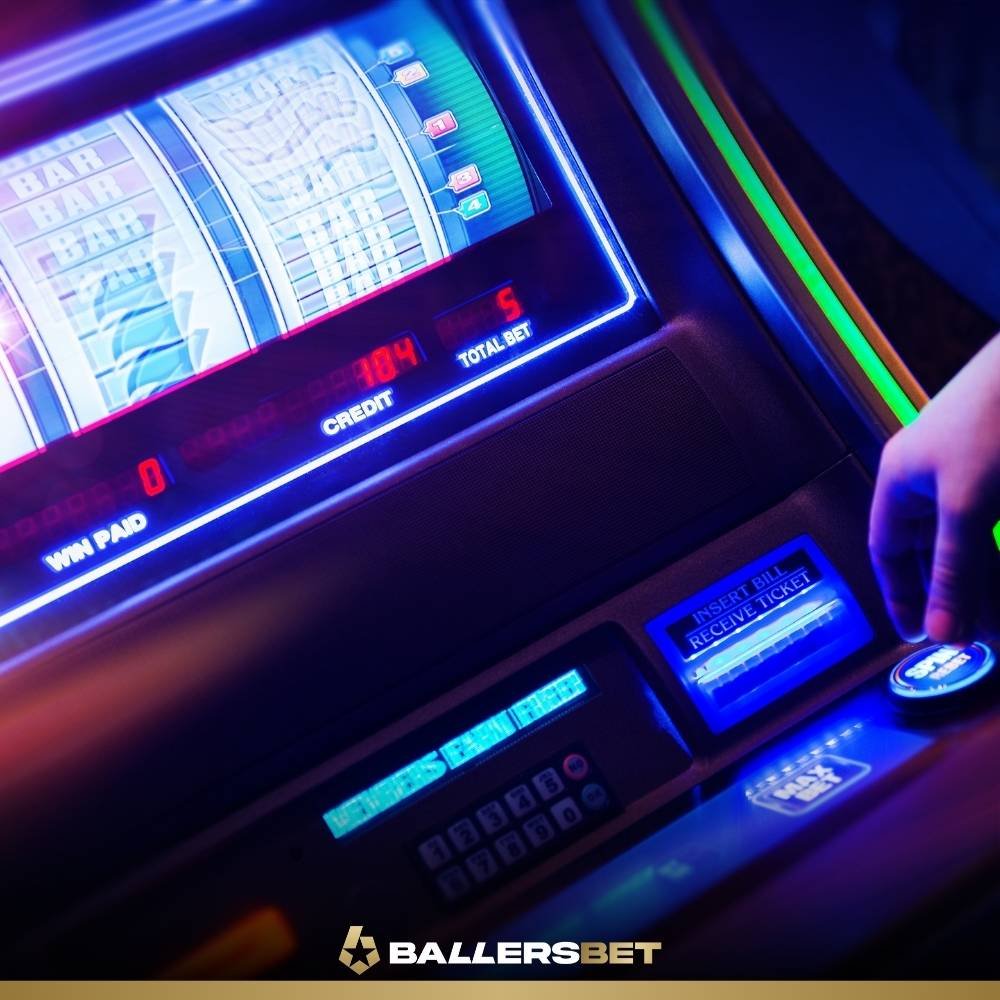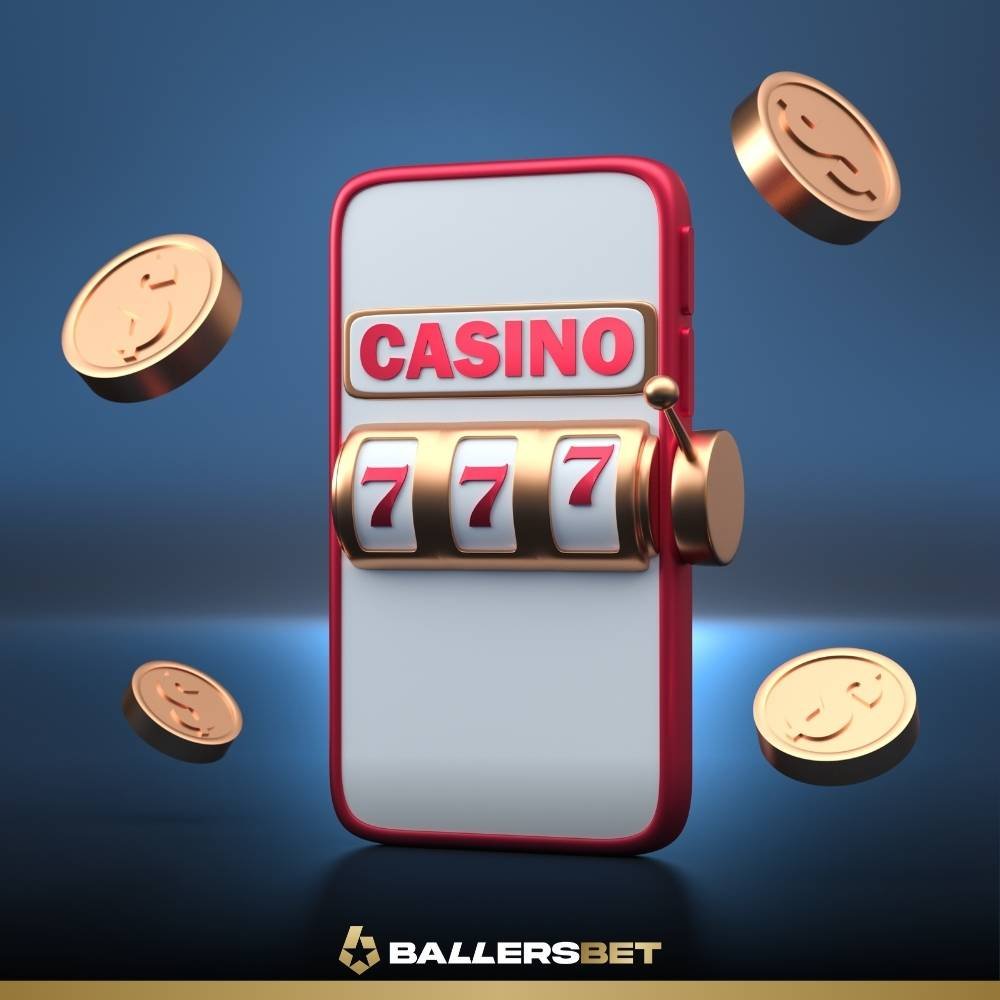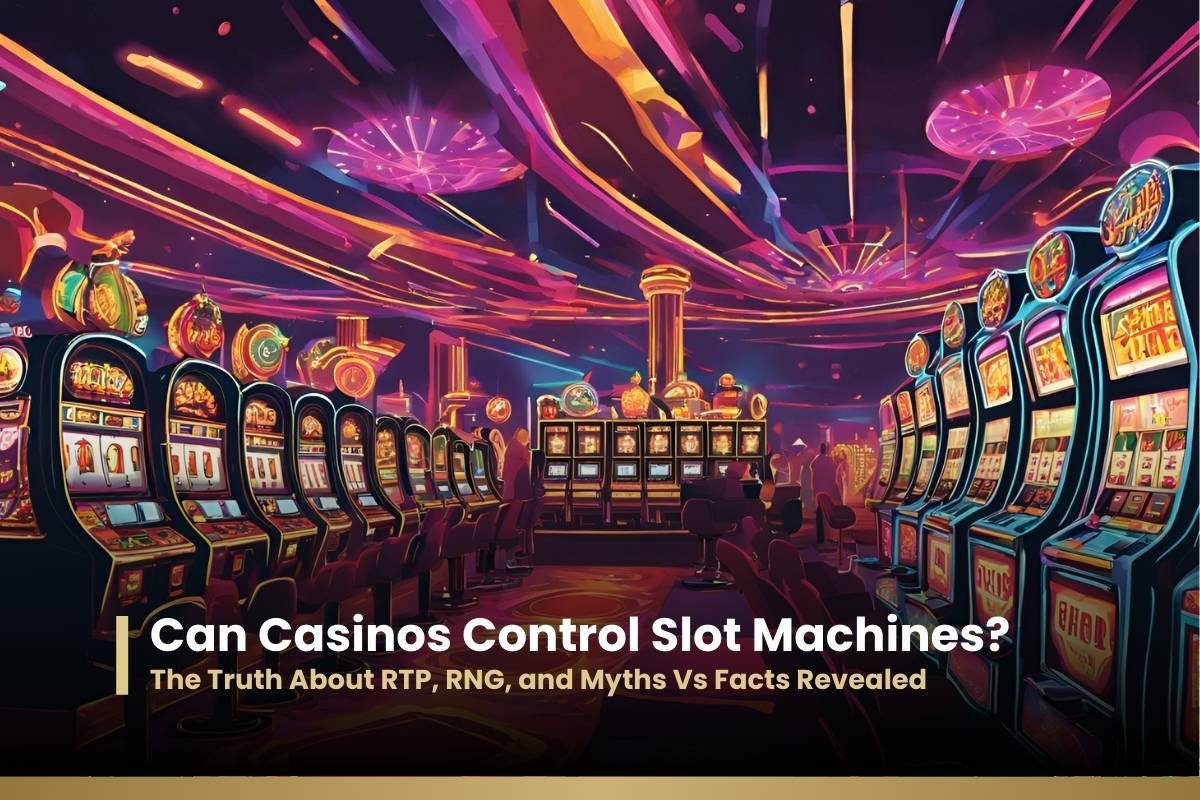Slot machines have been the heart of the casino for years, luring players in with big wins, flashing lights, and high stakes. But the question of whether can casinos control slot machines is a hot topic of debate.
Casinos can’t control the outcome of slot machines. Slot machines have Random Number Generators (RNGs), which make each spin completely random and independent. Casinos can set the machine’s Return to Player (RTP) percentage within limits but can’t control individual spins. Regulatory bodies enforce these limits to ensure fairness and transparency.
This guide will explore the truth about casino control of slot machines, the technology, the regulations, and common player myths.
How Slot Machines Work: The Basics

Slot machines are the most popular casino games, with bright lights, sounds and big payouts. However, the technology behind them is based on a complex set of rules, regulations, and mechanics that ensure fairness. Here’s how slot machines work, from Random Number Generators (RNGs) to payout percentages and laws.
1. Random Number Generators (RNGs)
- Function: At the core of every slot machine is the Random Number Generator (RNG), a computer program that generates random numbers 24/7, even when the machine is not being played. This means every spin is random and unrelated to previous outcomes.
- How RNGs Work: RNGs produce thousands of numbers per second, each corresponding to a different symbol combination on the reels. When you hit the spin button, the RNG will select a number that will determine the outcome of the spin. This makes it completely random and impossible to influence or predict.
- Fairness Tested: RNGs ensure fair outcomes. Independent testing labs like eCOGRA and Gaming Laboratories International (GLI) test RNGs to ensure fairness and compliance with gaming regulations.
2. Payout Percentages (Return to Player or RTP)
- What is RTP? The Return to Player (RTP) is the percentage of money a slot machine pays back to players over time. For example, a machine with a 95% RTP will return $95 for every $100 played over a long period. However, this does not guarantee individual player results and is based on long-term averages.
- Industry Standards: RTP percentages vary by game and jurisdiction. Most slot machines have an RTP between 85% and 98%, depending on the casino and regulations. For example, Las Vegas Strip casinos have machines with an average RTP between 90% and 95%.
- Why RTP Matters: The casino’s “house edge” is based on the RTP. For example, if a slot machine has a 95% RTP, the house edge is 5%, which is the casino’s expected profit margin over time. While this means the casino will make a profit, it also means the player has a fair chance to win.
3. Legal Oversight and Regulation
- Strict Regulations: Gaming commissions rigorously test and monitor slot machines to enforce fair play. Changes to machine software or RTP require regulatory approval.
- Player Protection: Laws in most jurisdictions mandate minimum RTP standards, protecting players and maintaining transparency.
More Facts and Figures
- Win Frequency: While the RTP shows long-term payouts, the frequency and size of wins vary greatly. Some slots are “high volatility” and have fewer but bigger wins, while others are “low volatility” and have more frequent but smaller wins.
- Number of Combinations: Modern slots have multiple reels and many symbols, and the number of combinations can be in the millions. For example, a slot with 5 reels and 20 symbols per reel can have 3,200,000 possible combinations (20 x 20 x 20 x 20 x 20).
- Player Behaviour: It’s worth noting that player behaviour, such as the timing of button presses, has no impact on the game’s outcome. The RNG is independent and continues to run regardless.
Slot machines are designed to be random and regulated to be fair and transparent. With RNG and predetermined RTP percentages, the casino gets a fair game and a house edge for long-term profitability.
Myth vs. Reality: Can Casinos Control Slot Machines?

Many players wonder if casinos can hack slot machines to change the outcome. While modern slot machines have remote access, it’s used for software updates, maintenance, adding features or fixing glitches – not to change the game.
Remote Access
- Advanced Slot Technology: Today’s online slot games have computer systems that allow the casino to update remotely. This is for system maintenance or feature additions, not to mess with the RNG, which ensures every spin is random and independent.
- Casino Management Systems (CMS): Casinos use CMS software to monitor and manage machine performance, but they can’t change outcomes or adjust results in real time.
Legal Restrictions on Manipulation
- Strict Rules: Gaming bodies like the Nevada Gaming Control Board and the UK Gambling Commission have strict laws that prevent unauthorized changes. All changes to RTP must be approved in advance, documented, and transparent, with some jurisdictions requiring a cool-off period before the machine can be used again.
- No Ad Hoc RTP Changes: Changing RTP percentages is heavily regulated. Any changes require approval processes and are lawful and transparent.
Statistics and Security
- Rare RTP Changes: Remote updates rarely involve RTP changes—less than 1% of cases in big casinos—and most are technical features.
- RNG Integrity: eCOGRA and other independent testing agencies certify RNGs so slot outcomes are random and not affected by remote access. Jurisdictions require transparency, and players are given RTP information.
Casinos can perform remote updates but cannot change the slot’s randomness. Strong regulations and frequent audits make remote manipulation a myth.
Does Your Players Card Affect the Slots?

Using a player’s club or loyalty card can influence the slots. This is a myth; the card does not affect the game. Here’s why.
Common Misconceptions
- Myth of Outcome Manipulation: Players think inserting a player’s card changes the odds of winning, but this is not true. The Random Number Generator (RNG), which determines each spin’s outcome, is independent and random regardless of card usage.
- RNG Integrity: The RNG continues to produce random results regardless of external factors, including player tracking systems.
Purpose of Players Cards
- Tracking and Rewards: Players’ cards are used to track play and reward loyalty. Casinos use this data to offer free meals, hotel stays, and other comps. For example, in major gaming hubs like Las Vegas, casinos give out millions of dollars in rewards every year to encourage continued play.
- No Payout Influence: The card system collects data for loyalty purposes and has no connection to or impact on the RNG. Payout percentages (RTP) are the same whether you use your card or not.
Statistics and Facts
- Consistent RTP: A slot machine’s RTP (95%) is the same over the long term, regardless of card usage. Research and independent audits show no statistical difference in payouts between using or not using a card.
- Regulatory Assurance: Gaming commissions monitor casinos to ensure player tracking doesn’t interfere with game outcomes. Casinos face heavy penalties for non-compliance, so it’s all fair and transparent.
Players cards are just tools to track player behaviour and reward loyalty. They don’t affect the odds of winning or the performance of the slots. The RNG ensures each spin is random and fair regardless of the card being inserted, so your chances of winning remain the same.
Statistics and Facts: Payout Percentages in Slot Machines
Slot machines have payout structures to balance player fairness and casino profitability. Here’s the lowdown.
1. Typical RTP Ranges
- Definition: Return to Player (RTP) is how much a slot machine pays back over time. On average, 90% means $90 back for every $100 played.
- The Typical Range is 85% to 98%. Higher is better for players, but it still gives the house an edge.
- Example: A 98% RTP slot pays back more in the long run than an 85% RTP slot, but individual results are random.
2. Slot Payouts by Location
- U.S. Casinos: In the U.S., RTP is 90% to 95% in regulated areas. Commissions enforce these standards to ensure fairness.
- Indian Casinos: These casinos are regulated by tribes, which can vary, but many match commercial casino RTPs to stay competitive.
- Global Comparisons: In the UK, the minimum RTP for online slots is 80%, in Macau, some slots are 85%
3. Win Frequency
- Volatility vs. RTP: A higher RTP doesn’t mean more frequent wins. High-volatility slots pay out less often but are bigger, and low-volatility slots pay out more often but are smaller.
- Choosing Games: Players can choose machines based on their risk tolerance, high volatility for bigger thrills and low volatility for steadier returns.
Bottom Line
RTP and volatility are key to slot machine payouts. With RTPs 85% to 98%, most regulated slots are fair and have a house edge. Now you know.
Can Indian Casinos Control Their Slot Machines Differently?
Indian casinos are governed by their own regulatory bodies not state gaming commissions. They are governed by tribal-state compacts which outline the rules for gaming operations including minimum Return to Player (RTP) percentages to ensure fairness.
Regulation and Compliance
- Federal and Tribal: Indian casinos must comply with the Indian Gaming Regulatory Act (IGRA) of 1988, which requires fair and transparent gaming. NIGC enforces these standards and requires regular audits and RNG testing.
- Same Standards as Commercial Casinos: Indian casinos have the exact RTP requirements and fair gaming as commercial casinos. Slot machines are tested independently to ensure compliance. Indian casinos are regulated to be fair with tribal and federal oversight, so they are as good as commercial casinos.
Indian casinos are regulated to ensure fairness, with oversight from tribal and federal bodies, making them as reliable as commercial casinos.
Can Casinos Change Slot Machine Outcomes Based on Player Behaviour?
Many people think casinos can change slot machine outcomes based on how you win or lose. But that’s not true for the following reasons:
1. Slot Mechanics Don’t Change
- RNG Technology: Slot machines are run by Random Number Generators (RNGs), which means each spin is random and independent. The mechanics don’t change based on your performance.
- No Behaviour-Based Adjustments: Casinos can’t program or change the outcomes of a slot machine based on a player’s winning or losing streaks. The odds and payouts are fixed and regulated and can’t be changed on the fly.
2. Why Machines Seem “Tighter” or “Looser”
- Perception of Winning and Losing: Players think machines become “tighter” (less likely to pay) or “looser” (more likely to pay) based on how they’ve been doing. In reality, these patterns are just random chance.
- Consistent RTP and RNG Functions: The RTP and RNG don’t change based on how long or how often you’ve been winning or losing. Any changes are in your head, not the machine.
Summary
Casinos can’t change slot machine outcomes based on player behaviour. Slot machines run with the same RNG and fixed RTP.
How Casinos Don’t Manipulate Slots
Casinos don’t need to manipulate slots to make money. They use built in mechanisms and player psychology to generate revenue.
1. Relying on RTP
- Long-Term Profit: Slot machines are programmed with return-to-player (RTP) percentages that give the casino a long-term profit. For example, a machine with a 95% RTP gives the casino a 5% edge, so they make money without changing the outcome.
- Fair Odds: The RTP gives the casino fair odds of winning to the player and still makes money.
2. Player Experience
- Attractive Game Design: Casinos spend money on slot games that are fun and visually appealing, with great themes, graphics and sound effects to keep players playing.
- Rewards and Loyalty Programs: To encourage long-term player engagement, casinos offer loyalty points, bonuses, and rewards to enhance the overall player experience and keep them coming back.
Summary
Casinos make money by using RTP and focusing on player experience without manipulating the slot outcome. Games and rewards also encourage players to come back and play.
How Casinos Benefit Without Manipulating Slots
Thanks to smart game design and player engagement, casinos win from slots without manipulating individual results.
1. Relying on RTP
- Guaranteed Profit: Casinos set Return to Player (RTP) percentages, which gives them a built-in edge and means long-term profits. For example, 95% RTP means the casino will win 5% of all bets over time.
- Fair for Players: RTP means players have a chance to win, which means players will trust and keep playing.
2. Player Experience
- Game Design: Casinos focus on creating fun slots with great themes, graphics, and sound effects to attract and retain players.
- Reward Programs: Loyalty and bonuses keep players engaged, so they return and play longer.
Casinos win with RTP and have a great gaming experience. There is no need to alter slot results. Engage players with fun games and rewards.
Conclusion
Transparency in Gaming
Slot machines are regulated to be fair and tamper-proof. While the casino has control over the RTP within the limits, the outcome of each spin is random and independent and not directly interfered with by the casino.
Player Awareness and Education
Knowing how slot machines work, including RTP and RNG, helps players make informed decisions, enjoy the game with realistic expectations, gamble responsibly, and understand the game itself.
Note: Ballersbet is a betting platform for users 18+. Betting carries financial risk, so please gamble responsibly and make informed choices.

I’m a Michele, Casino Analyst and Reviewer at Ballersbet.com, where I specialize in providing honest insights and expert reviews of the latest casino games and platforms. With a passion for online gaming and a commitment to transparency, I strive to help players make informed decisions in the ever-evolving world of online casinos.






